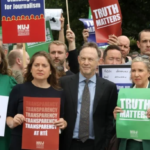TD lashes government carbon tax plan in the absence of the promised review
People Before Profit TD Bríd Smith has accused the government of relentlessly pushing a carbon tax on individuals, despite not conducting due diligence on the impact that this tax would have on people living in or in danger of fuel poverty following its much-vaunted Government Climate Action Plan 2019.
The threat of the politicization of the carbon tax issue in the closing stages of the Oireachtas Committee’s deliberations resulted in a compromise wording which secured the consent of the four mainstream parties to a rise in carbon tax to €80 by 2030 as part of a suite of measures that also recommended that “the Government should conduct a review to be completed by June 2019 into the most appropriate measure of, and the extent and nature of fuel poverty across all cohorts…”
Alarmingly, the Government’s response to a PQ submitted by Deputy Smith this week indicates that no such review is in progress or planned. Instead the Government enumerates its involvement in several ancillary projects (including the allocation of carbon tax revenues) and previous reviews while steadfastly refusing to acknowledge that it is not in fact implementing this priority recommendation of the Oireachtas All-Party committee.
Bríd Smith TD said:
“The government have relentlessly pushed for the imposition of a carbon tax on individuals, whilst not even attempting to investigate the potential impacts on people living in fuel poverty.
“We are appalled at this outcome for two reasons. The first relates to the use of a disingenuous government ruse to secure a (majority) cross-party consensus to increase carbon taxation while seeking to silence and marginalise well-founded questions about the legitimacy of this taxation measure.
“The second, and more fundamental concern, relates to the recklessness, indifference and arrogance of a government intent on proceeding with increasing carbon taxation which will exacerbate the economic hardship of those already in fuel and energy poverty and plunge other groups already struggling to survive into this insidious form of poverty without first comprehensively establishing the extent and nature of the existing problem.
“We can only conclude that the Government’s failure to conduct this important review, or answer the questions I have asked about the issue, must be attributed to its fear that uncovering the actual extent and nature of existing fuel poverty alongside the numbers vulnerable to entering energy poverty would undo the cross-party consensus which it has so carefully engineered around this most regressive and punitive of taxation measures.”












